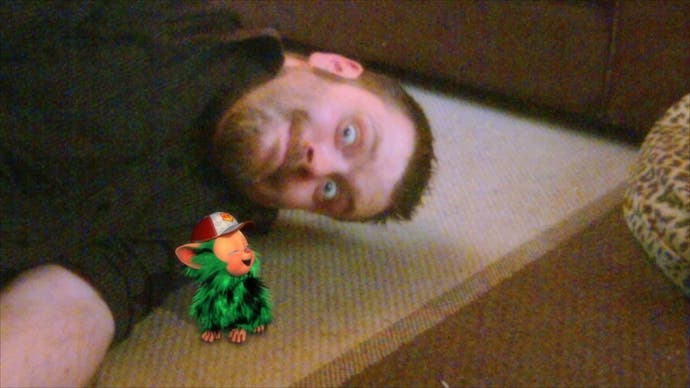EyePet
Not just for Christmas or just plain not for Christmas?
The most impressive things about EyePet sneak up on you. Take the way your new virtual pet casually jumps over your arm if you cross its path while activating one of its many toys and gadgets. Catch it unaware and the same movement accidentally knocks it over on its adorably furry little backside. And if your toe strays into the frame, it scampers over to investigate.
These little moments are so natural, and so casually confident in the way they sell the illusion that there really is a tiny sentient monkey creature on your floor, that you can easily take them for granted, and overlook the way that Sony's alternative to man's best friends is quietly pushing the PlayStation Eye in new directions. Well, relatively quietly.
You're introduced to the world of EyePet by a paternal scientist, who tells you he's researching these odd little beasts in a video that also explains what needs to be done to set up your camera - basically, place it somewhere around knee height, pointed down at the ground - and then walks you through the etiquette of EyePet care.
As a showcase of what console cameras and motion-sensing is capable of, what then follows deserves applause. The technology can't help but creak at times, but it's used for such endearingly whimsical aims that it can feel cruel to criticise. Sadly though, criticise we must, since the charming realisation of this digital lifeform doesn't always gel with the game-shaped box it's been squeezed into.

Your pet arrives as an egg, and even this initial stage reveals frustrations that never quite disappear. First you must warm the egg by using a heater. The game comes with a "magic card", which is essentially a black plastic placard with a white square and a paw-print on it. The camera reads this image to work out which way up game objects will appear. So you place the card on the floor and, on-screen, a heater appears on top of it. You activate the heater with a button on the top, but you need to maintain a bizarre and frankly uncomfortable constant wafting motion to keep the button pressed long enough to warm the egg.
Once a crack appears, you rock the egg gently from side to side. It's here that the most significant obstacle comes into play - you can never fully ignore the fact that you're interacting with intangible objects, and the lack of sensory feedback makes finding the right rocking rhythm more hassle than it should be. Your hands float through and behind the object you're trying to "touch", and when it doesn't do what you want, there's no fallback other than to keep gesticulating.
Thankfully, once the little critter pops out of his shell, things pick up considerably. You can tickle him and he'll purr and coo and - eventually - roll over for tummy tickles. Drum your fingers on the floor and he'll chase and pounce like a kitten. Wiggle your fingers in the air, and he jumps to grab them.
It's very cute, but hardly the foundation of a satisfying game experience. That's where the EyePet science comes in. The Pet Programme in the pause menu takes you through a series of daily tests and challenges, introducing and evolving your interactions with your pet. The trampoline is fairly basic, but once you get the sketchbook you start to see just what the software can do.
Draw a picture on a piece of paper and hold it up to the camera and your EyePet will try to copy it. It only works with bold black outlines (marker pen is best, crayon is pretty terrible) but the effect is still both impressive and immersive. Microsoft's Natal may be able to extract emotional nuance from such interactions, but the simple thrill of seeing your doodle instantly imitated on-screen shows that there's life in the dear old webcam yet.








